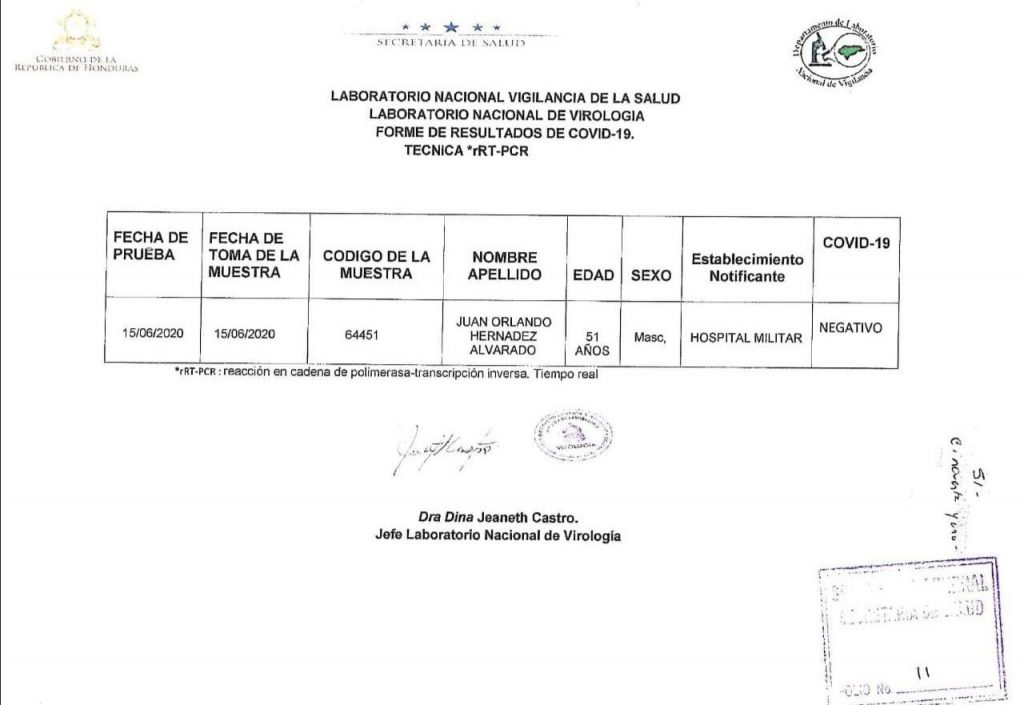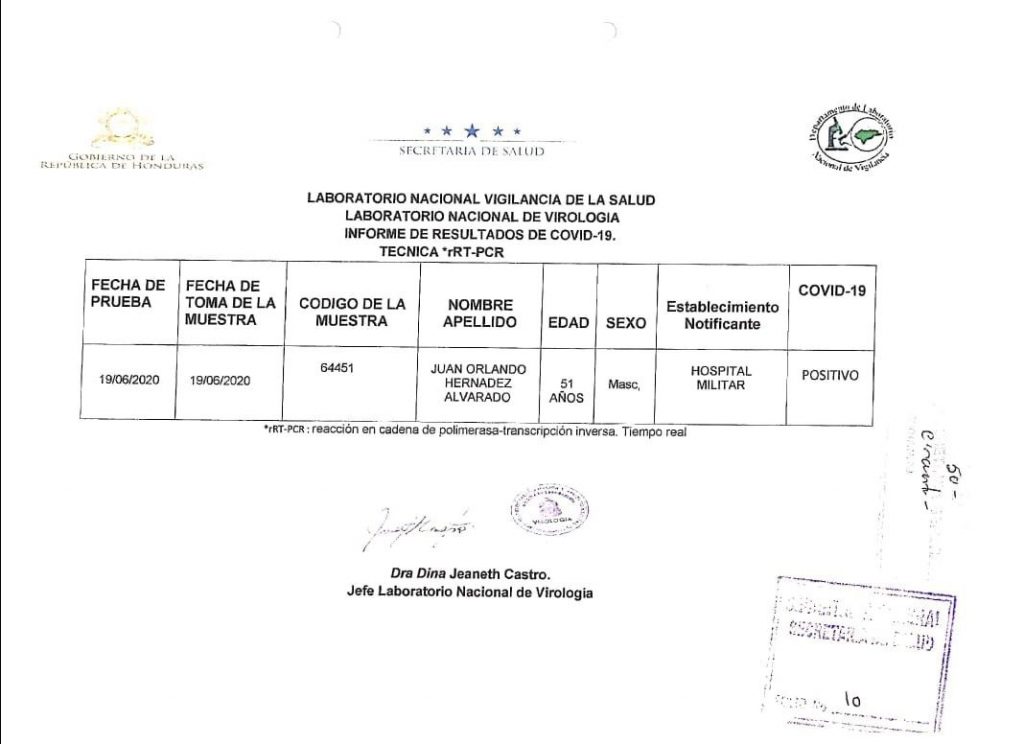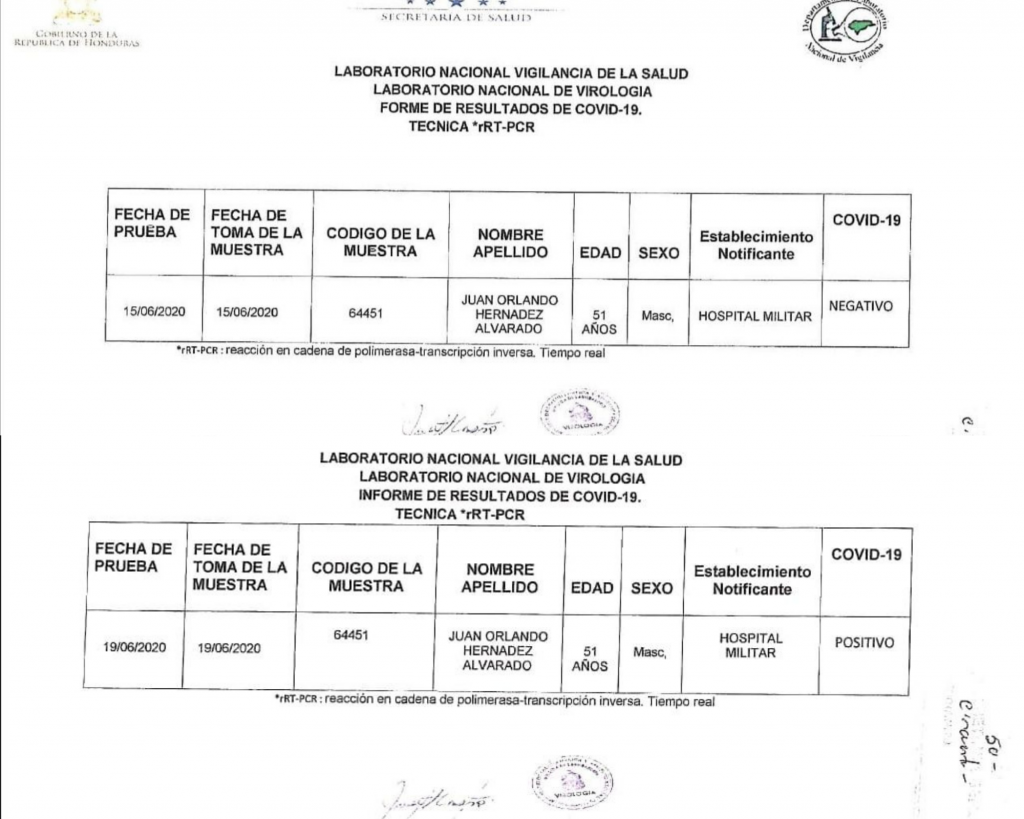Six months after Contracorriente submitted a formal information request to the Institute for Public Information Access (Instituto de Acceso a la Información Pública – IAIP), the Ministry of Public Health released information confirming that President Juan Orlando Hernandez tested negative for COVID-19 the day before he made a public appearance where he stated that he and his wife had tested positive for the virus.
The IAIP commissioners voted in favor of fulfilling Contracorriente’s information request submitted on June 18, and subsequently ordered the Ministry of Public Health to publicly release information regarding the results of President Juan Orlando Hernandez’s RT-PCR test (reverse transcription polymerase chain reaction) for COVID-19. The test result report was signed by Dr. Dina Jeaneth Castro, head of the National Virology Laboratory.
Hernández professed to be the first president in the Americas to contract the COVID-19 virus, but our investigation clearly demonstrates that the president’s statements are inconsistent with the test results report issued by the National Virology Laboratory.
n June 16, Hernandez stated that he and his wife, Ana Garcia Carias, had tested positive for the COVID-19 virus. That same night, the Office of the President issued a statement reiterating the president’s earlier remarks, and specifying that the couple had undergone the PCR type of test. However, the official results report contradicts these statements.
According to the recently released Ministry of Public Health document, Hernández has had PCR tests on two occasions. The first PCR test (sample code #64451) was conducted on June 15 at the Military Hospital, and yielded a negative result. This test is the one referred to by the president on June 16 when he stated, “I began to feel some discomfort over the weekend and today I was diagnosed with COVID-19.”

The Military Hospital admitted the president the morning of June 17 even though he hadn’t actually tested positive for the virus. Later that day, Dr. Francis Contreras, spokesperson for the national emergency management agency (Sistema Nacional de Gestión de Riesgos), stated that the president had been admitted as a precautionary measure due to test results that allegedly detected “mild pulmonary infiltrates.”
Several international leaders expressed their concern for Hernandez, including Luis Almagro, Secretary General of the Organization of American States (OAS); Dante Mossi, president of the Central American Bank for Economic Integration (CABEI); and Alejandro Giammattei, president of Guatemala.
Administration officials and others close to Hernandez were enlisted to get the word out about the president’s illness. Public Health Minister Alba Flores was quoted in a press release issued by the Office of the President as saying, “The president and his wife are doing very well after testing positive for COVID-19.”
Another press release from the Office of the President stated that “pulmonologist and infectious disease specialist Tito Alvarado confirmed that President Juan Orlando Hernández has tested positive for COVID-19. He has also been diagnosed with bilateral pneumonia, so he is being treated with the CATRACHO drug regimen developed by Honduran doctors.” An earlier statement indicated that the presidential couple were also undergoing the MAIZ (microdacyn, azithromycin, ivermectin, zinc) treatment recommended by the Ministry of Public Health to lower the viral load in COVID-19 patients.
Pastor Roy Santos added to all of the expressions of concern about the president’s health, saying he was “praying for the presidential couple.”
The information released by the Ministry of Public Health indicated that a second test was conducted on June 19 at the Military Hospital while Hernandez was still hospitalized there, and processed by the National Virology Laboratory. The test report indicated a positive result, but experts in virus test processing expressed some doubt about this since both tests have the same 64451 sample code number.

An expert who prefers to remain anonymous explained to Contracorriente that the sample code numbers cannot be the same even if the samples pertain to the same person. Sample code numbers identify a specific sample, which is essential for differentiating between test results. All Honduran laboratories conform to this procedure, so doubt remains about whether the sample from the positive test result is the same sample that yielded a negative test result on June 15. Or perhaps the Military Hospital operates differently to all the other laboratories in Honduras.
The document sent by the Ministry of Public Health to Contracorriente and certified by the National Virology Laboratory doesn’t elaborate on the two sample codes. We contacted the Ministry of Public Health for an explanation and have not yet received a response.
An information request fulfilled six months later
The Ministry of Public Health classified the president’s virus test information as confidential on June 23, and denied Contracorriente’s information request, which is a violation of Honduras’ Access to Public Information Act and also contravenes international standards. The ministry’s transparency unit justified this confidential classification citing “Article 3, paragraph 7 of the Law on Transparency and Access to Public Information, which refers to confidential personal data such as data related to physical or mental health status, personal or family assets, and any other data relating to personal or family privacy and reputation, or to an image of the person.”
On July 7, Contracorriente formally appealed the denial of its information request on the grounds that the requested information was not a threat to the president since he had already announced the test results, and that the failure to release the information would be detrimental to the public interest due to the president’s 15-day absence from his official duties. The formal appeal also claimed that a negative test result would have national administrative and political implications for the president.
On July 15, IAIP president Hermes Moncada, signed an injunction ordering Public Health Minister Flores to provide the results of the president’s COVID test within three days. The information was finally released five months later.
The IAIP legal department ultimately issued opinion USL-356-2020 regarding the Contracorriente appeal, which led the IAIP commissioners to issue a new resolution on October 30 in which it again ordered “the immediate delivery of the information requested in whatever format is available,” on the grounds that the president’s own public statements on the matter constitute consent to release the information.
The Ministry of Public Health’s failure to comply with this resolution prompted the IAIP to ask the Attorney General to enforce its resolution and to impose a fine on Minister Flores. Before these enforcement measures could be carried out, the Ministry of Public Health sent the information to the IAIP on November 16, which then forwarded it on December 16 to Contracorriente.
Read the process about this investigation here.







